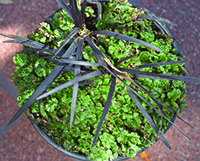

|

|
|
2012 Highlights: UC IPM Annual Report Liverworts?primitive plants without flowers, seeds, leaves, or roots?form mats on the soil surface. Photo by S. Tjosvold. Liverworts?primitive plants without flowers, seeds, leaves, or roots?form mats on the soil surface. Photo by S. Tjosvold.Mulch and natural herbicides control liverwortsIN BRIEF
In ornamental plant production, liverworts are a serious weed problem. But UC IPM Advisor Cheryl Wilen and other UC Cooperative Extension advisors, including Steve Tjosvold and Richard Smith, are working to see if mulch, plus certain natural herbicides, can manage these primitive plants. In open nurseries and shade houses, early results show cocoa hull mulch provides excellent control. Mustard seed meal applied to liverwort potentially provides postemergent control, while Scythe (pelargonic acid), Bryophyter (oregano oil extract), and Weed Pharm (20% acetic acid) look promising. These herbicides—called biorational herbicides—are of natural origin and have little or no long-term adverse effects on the environment or beneficial organisms. More work still needs to be done to determine the best particle size for the mulch, and the best rate, timing, and crop selectivity for these herbicides. Liverworts cause all sorts of problems. The mat they form blocks water from overhead sprinklers. Sometimes they crowd slow-growing plants, while small plants can struggle to develop. Liverwort in containers can spread to other moist areas of the nursery and provide a home for fungus gnats and snails. Also, people don’t want to buy containers with liverwort. > Next article: UC IPM publishes national detection guidelines for walnut twig beetle |